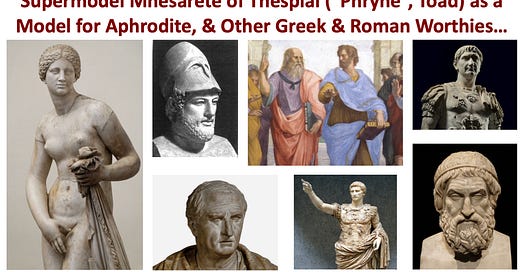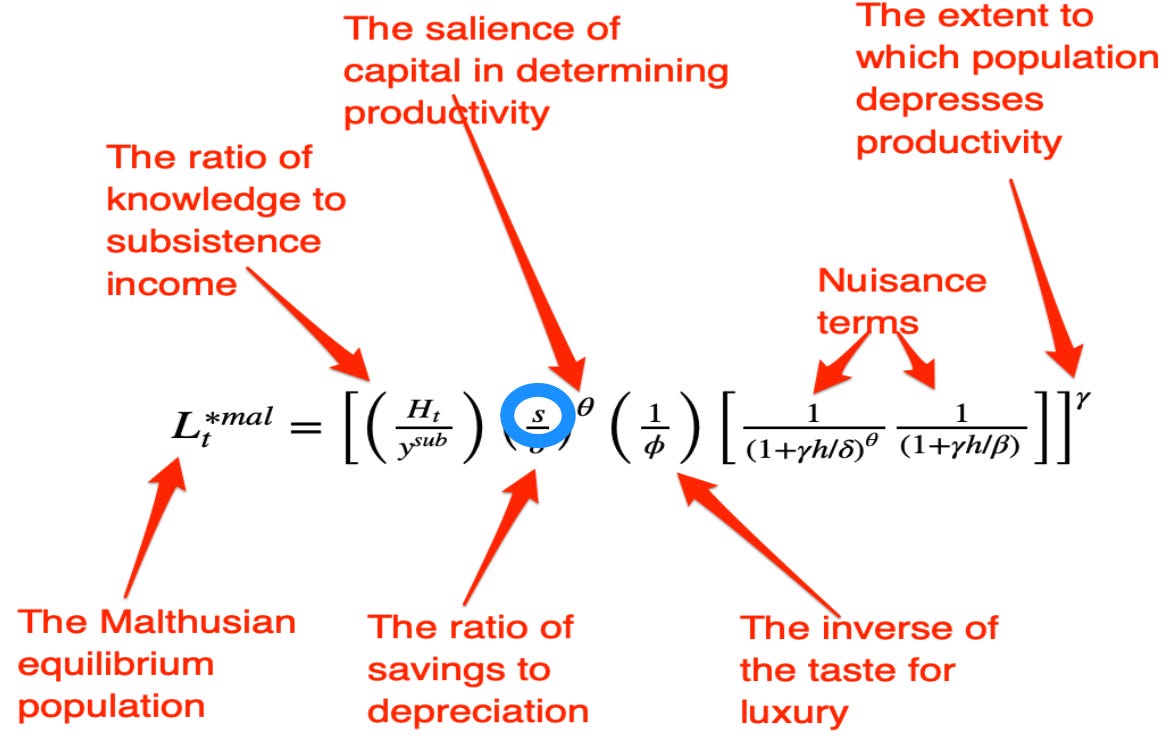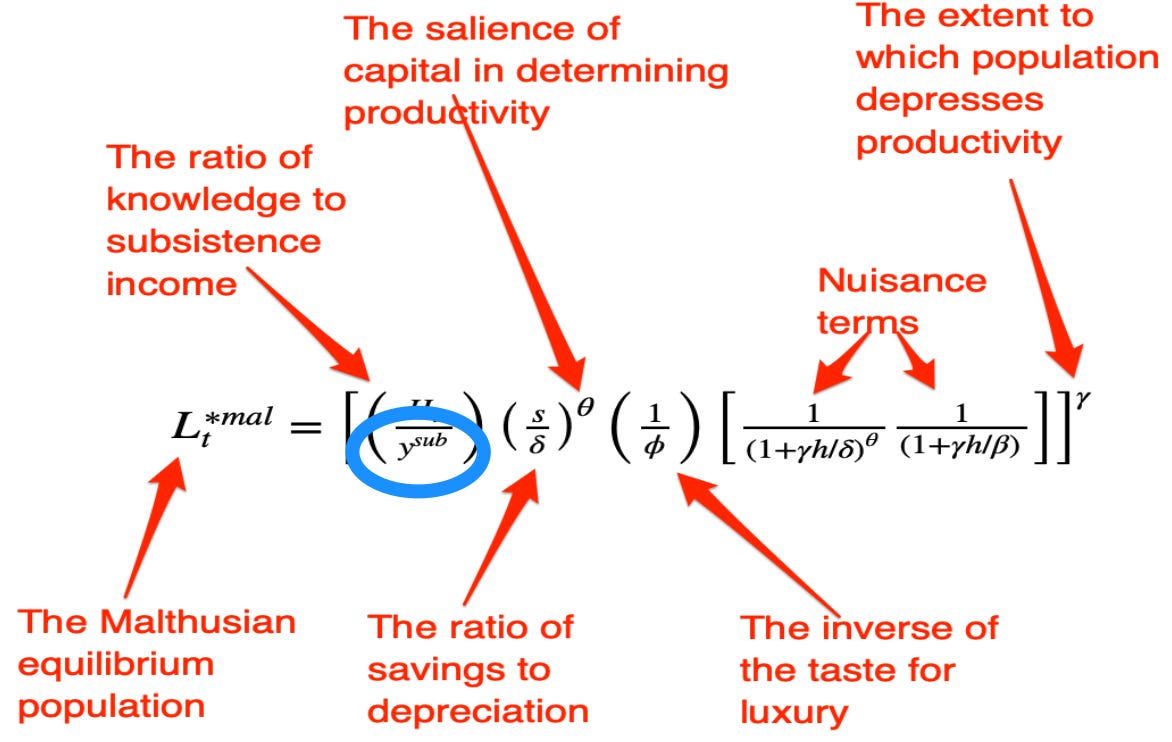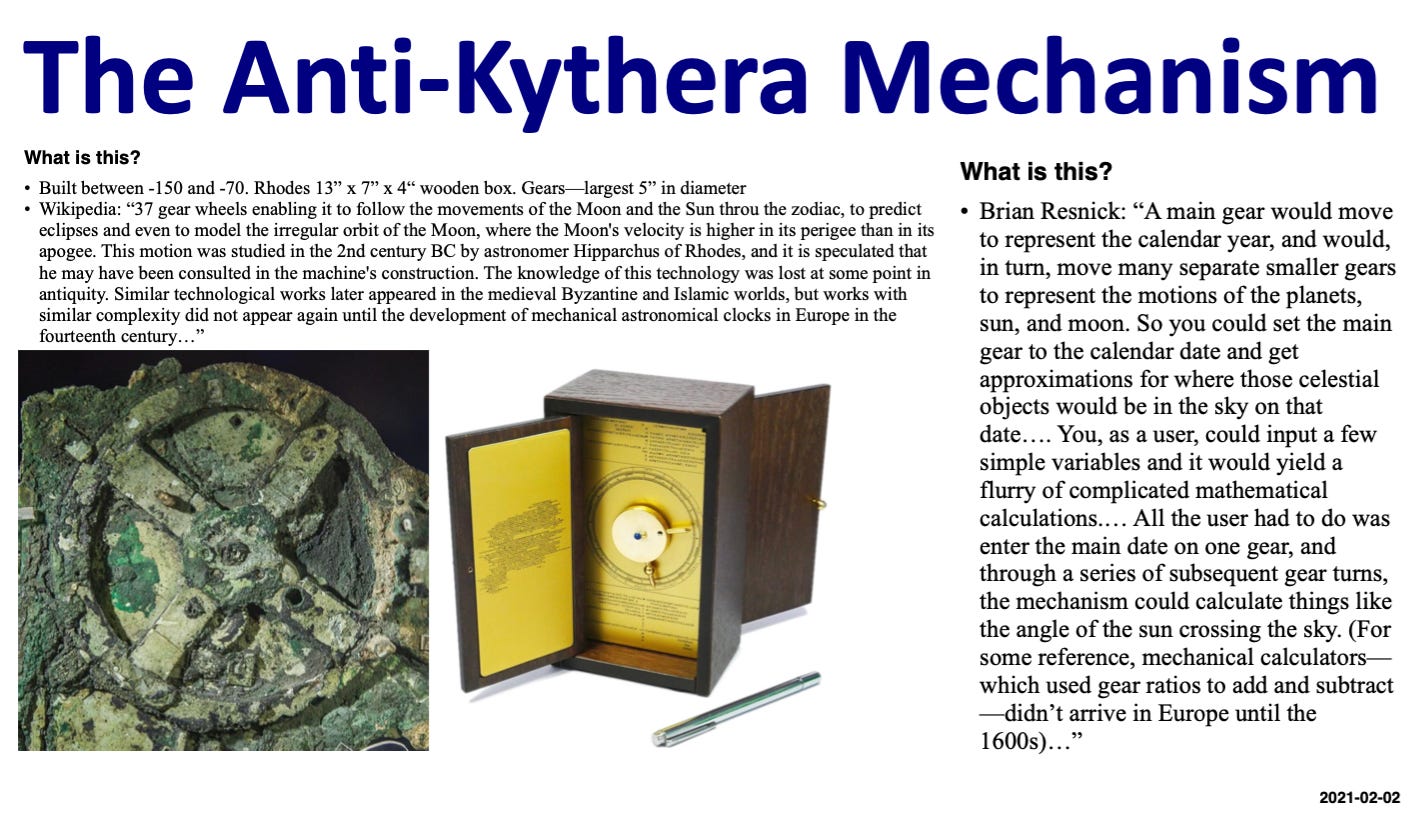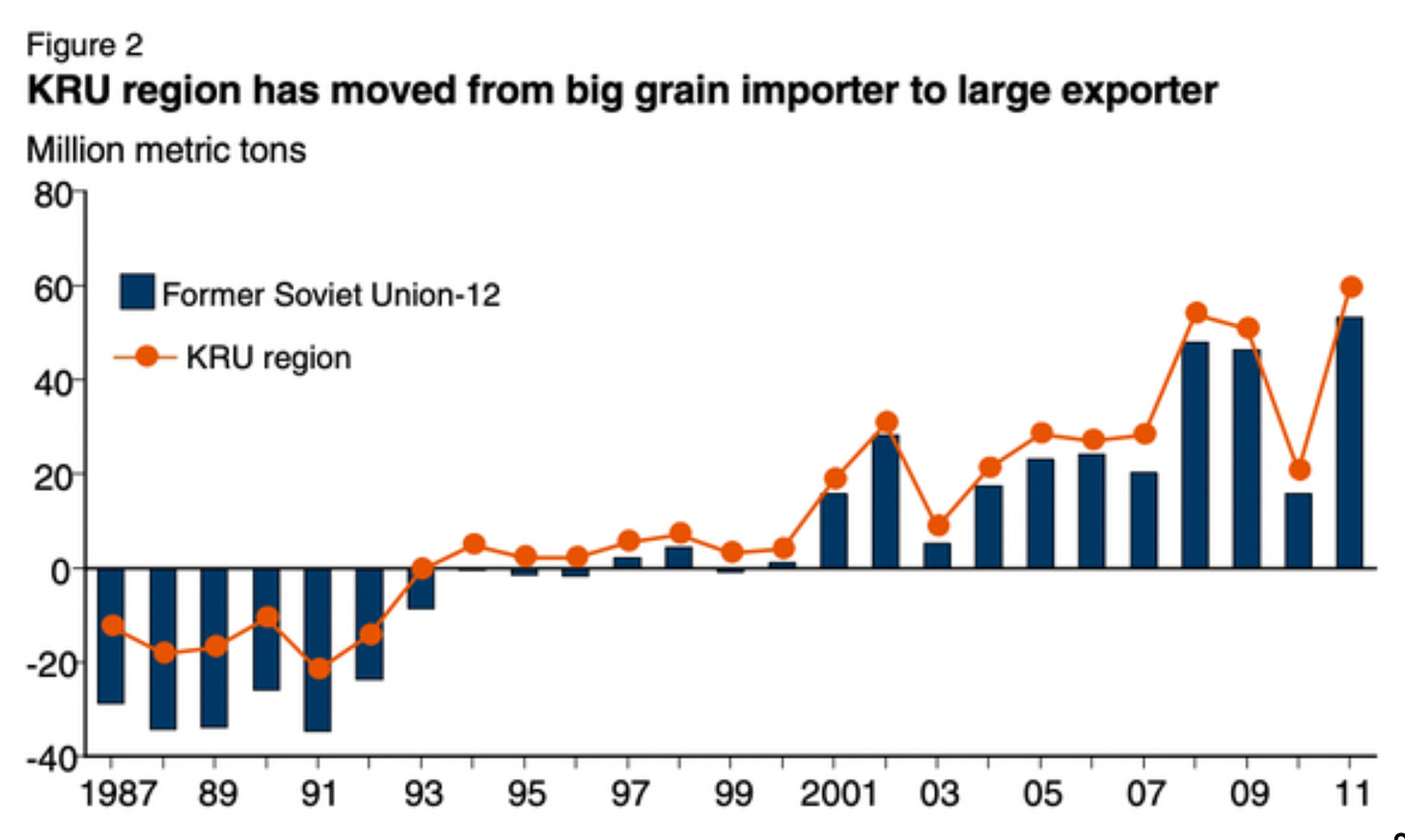First: A Quick Glance at Ancient Greece
In the context of relatively stagnant Malthusian economy—one in which a good millennium sees humanity’s deployed technological mastery grow by 5% per century, and material standards of living for typical humans grow at 10% per century—the “efflorescence”, to use Jack Goldstone’s word, of Greek civilization after the year -800 is simply gonzo.
Perhaps 300,000 people who called themselves Hellenes in the year -800 became perhaps 4 million in the year -300. And that was only the appetizer. Thereafter, following in the wake of the armies of Alexander the Great, and then the expansion of the Roman Empire to the Danube River, Greeks colonized city after city and spread out into the countryside from the Al-Fayyum oasis in Egypt to the Punjab, and from Alexandria Eschate near modern-day Tashkent to Marseilles in France.
Alongside the extraordinary growth of the Greek population is a remarkable increase in the average age of death among adults. There appears to be much less violence inflicted upon adults—either through violence directly applied, or through violence depriving adults of the resources that they need to keep living.
What do I mean by “less violence”? Consider what Odysseus says about what he did after the Trojan War was over, immediately after he and the twelve ships of Ithaka departed the shore:
What of my sailing, then, from Troy? What of those years of rough adventure, weathered under Zeus? The wind that carried west from Ilion brought me to Ísmaros, on the far shore, a strongpoint on the coast of the Kikonês. I stormed that place and killed the men who fought. Plunder we took, and we enslaved the women, to make division, equal shares to all— but on the spot I told them: ‘Back, and quickly! Out to sea again!’ My men were mutinous, fools, on stores of wine. Sheep after sheep they butchered by the surf, and shambling cattle, feasting,—while fugitives went inland, running to call to arms the main force of Kikonês. This was an army, trained to fight on horseback or, where the ground required, on foot. They came with dawn over that terrain like the leaves and blades of spring. So doom appeared to us, dark word of Zeus for us, our evil days. My men stood up and made a fight of it backed on the ships, with lances kept in play, from bright morning through the blaze of noon holding our beach, although so far outnumbered; but when the sun passed toward unyoking time, then the Akhaians, one by one, gave way. Six benches were left empty in every ship that evening when we pulled away from death. And this new grief we bore with us to sea: our precious lives we had, but not our friends. No ship made sail next day until some shipmate had raised a cry, three times, for each poor ghost unfleshed by the Kikonês on that field…
At the moment when he says this, Odysseus has just been washed up, a castaway, in the land of the Phaiakia. They ask him how he got there. And the story he tells them is that he is a pirate. It is, moreover, a pirate who keeps pirating. When Odysseus leaves Troy, he has just finished fighting the long and brutal Trojan War. He and his crew have their plunder from Troy. Yet the first thing they do is pirate. Plus they are rather stupid and undisciplined about pirating. In such an environment, is anybody going to save and invest a lot? Or, rather, is anybody going to save and invest in anything other than weapons and weapons training both to (a) make you and yours a hard and difficult target for the pirates, and (b) make yourself more effective when you go pirate?
The economy’s ratio of savings to depreciation s/δ is surely going to be low, depressing the population. We can feed this into our basic if over-complex theoretical model of an economy in Malthusian equilibrium:
Moreover, the risk that, as you mind your own business, Odysseus and company, well-trained, well-equipped, battle-hardened, will come along and, just because they can, “stormed that place and killed the men who fought. Plunder we took, and we enslaved the women…”—such high risks of violent death must, in Malthusian equilibrium, be offset by reduced mortality risk from disease and such. Hence the economy’s level of subsistence-necessities consumption will also be high. That also depresses the population, at least in our over-complex model:
Not in the model, but potentially very real: A low population density means that ideas that are known and deployed somewhere will have a difficult time diffusing throughout a civilization. A low population density means that the “Smithian” productivity gains from using those ideas to build an extensive and highly productive division of labor will be difficult to attain.
Yet from this Early Iron-Age Dark-Age beginning after the collapse of the high Mycenaean civilization of the Late Bronze Age, the Greek peoples built a civilization.
As Josiah Ober has written, the Greeks moved out of:
the violence and gift-exchange economy that characterized what Finley (1965) famously called “the world of Odysseus”…. There was in fact sustained and substantial growth in the Greek economy between the ages of Homer and of Plato and Aristotle… driven by (1) efficient methods of production, predicated on relative advantage and aimed at increasing the quantity as well the quality of goods produced, and (2) by market exchanges based on voluntary contracts. Moreover, the rational Greek state (notably, but not exclusively Athens) was increasingly cognizant—through its legislative, judicial, and administrative functions (ch. 5)—of the social (and taxable) value of providing rules and infrastructure aimed at facilitating the profitable production and exchange of goods…. Ancient Greeks, as individuals and collectives, frequently employed economic rationality, i.e. rationally instrumental reasoning in economic contexts….
All-in-all, this appears to be a remarkable civilizational accomplishment, and not one limited to the enrichment of a luxurious predatory upper class. Houses got bigger—a lot bigger. Trade and the division of labor flourished. There is a reason that the Greeks have a predominant place in our cultural memory. That reason is not that they are "our" ancestors, whoever "we" happened to be. The people who decided that universities should study the Greeks lived on the island of Britain, in the upper Thames river valley near Oxford and in the fins of Norfolk near Cambridge. They were in nowise descendants, biologically or culturally, of the ancient Greeks. Nobody in England in 1450 could speak or read Greek. Yet the inhabitants of the valley and the fens adopted them as their predecessors in what they decided to call “western civilization”.
Emerging out of the Iron “Dark Age” of -1200 to -800, the Greeks built a unique institutional framework: the city-state. It emerged with functional systems of governance which provided public goods—security, boundary stones, marketplaces, mediators, dispute resolution. This initiated a period of sustained increases in living standards. How is that consistent with Malthusian equilibrium of any sort? Recall that in our model there are “luxuries”: commodities that enrich human flourishing but do not contribute to reproductive fitness, chief among which is a taste for living in cities, with a high taste for luxuries modeled by a large value of the coeffient ɸ.
A strong taste for luxuries gives us a high standard of living and level of productivity in Malthusian equilibrium. A high level of savings and investment gives us a high population density in Malthusian equilibrium.
Now do not overstate the accomplishment. While Ancient Greece did have a period of democracy, it was relative short (less than 200 years) compared to the duration of the polities. Even during Greece’s Democratic Age, most poleis remained oligarchies. And remember! Most citizens—slaves, poor citizens who couldn’t afford their tax bill, women—could not participate even in smallholder democracy. The Greek rules according to which the society was organized tended to be “extractive”—at least if you were not one of the equals who were full citizens. And the economy was largely based upon slavery. (Do note, however, that with some notable exceptions like the Spartan helots and the Athenian and Syracusan mines), this slavery was small-scale rather than plantation slavery: it was ripping somebody out of their social context and placing them in a position in which they had no family or other trusted companions to provide them with any social power.)
At and near its peak, the civilization had astonishing creative achievements. Look at the people of ancient classical civilization. In rhetoric and politics, we have Perikles and Cicero. In generalship, should we have Cæsar and Alexander. In governance? We have Augustus and Trajan. In philosophy we have Aristotle and Plato. In sculpture and literature we have Praxiteles and Sophokles. They are our equal, even though they knew much less and did not stand on the shoulders of giants.
Even in something like making a good living through mass media via presenting yourself as a celebrity there were equivalents then who are our equals now. Consider Mnesarete of Thespiai. Her name means “Remembrance of Excellence”. But she was called Phryne: toad. Why? Because people thought her skin color, yellow, was like that of a toad. That was thought very very attractive in the Athens of the -300s. Phryne was the favorite model for Aphrodite of the sculptors of her day. And I do not think she would have had anything to learn from Kim Kardashian about how to manage your celebrity. After all, 2000 years after her death people were still writing poems about and marveling at statues of her as Aphrodite.
The ancients were—at least those who were not protein-deprived in utero from malnutrition—our equals in intelligence, cultural sophistication, mechanical ingenuity, intellectual creativity, and, in short, in the ability to think and do.
Let me pick one example of Greek accomplishment that is at least adjacent to the process of technological innovation and development that has driven our civilization to its high prosperity. Let me talk about the Anti-Kythera Mechanism.
Found in a shipwreck offshore of the southern tip of the Peloponnesian peninsula, the Anti-Kythera Mechanism was built between -150 and -70, probably by artisans and scientists on the island of Rhodes. As reconstructed, its outer shell was a 13” x 7” x 4“ wooden box Inside were gears—with the largest of them 5” in diameter. It looks as though there were 37 gear wheels in all.
It was a mechanical computer, a clock calendar, astronomical observation and modeling device. By turning a crank on the side, you turned the interlinked gears to make pointers on the outside of the box tell you the location of astronomical objects on any particular day. A user of the Anti-Kythera Mechanism could thus follow the movements of the Moon and the Sun through the zodiac. He—almost surely a “he”—could predict when it was likely that there might be eclipses. The box even modeled the irregular orbit of the Moon, for the Moon's orbit is not a circle but an ellipse, and so its velocity as it revolves around the earth is greater when the moon is near its perigee than when it is near its apogee. (That motion had been studied in the late -100s by the astronomer Hipparkhos of Rhodes; a natural speculation is that he may have been involved in the mechanism’s construction.) It includes, in concrete mechanical gear-driven form, the most advanced astronomy known to the Greeks.
The technological competence to make such a mechanism was lost. The astronomical knowledge was lost in the Latin Western Mediterranean, but preserved in the Greek Eastern Mediterranean and eagerly sought by the Muslim Middle-East, where the transfer of a copy of Claudius Ptolemy’s Almagest to Baghdad was demanded by the Kalifa Al-Ma’mun before he would sign a peace treaty with the Byzantine Empire. What they made was less complex, however: mechanisms of similar complexity would not be seen again until the mechanical astronomical clocks made in Western Europe more than a thousand years later, in the 1300s. Ancient civilization was capable of making devices of extraordinary complexity and precision.
When it was shipwrecked, the Anti-Kythera Mechanism was being carried from somewhere in the Aegean Sea region to somewhere in Italy. Was it booty that Roman commanders were carrying home after a successful conquest or raid? Was it commissioned by some wealthy Roman worthy to put on display in his house? Was it going to be an educational tool that a Greek philosopher or slave-tutor would use for demonstrations or lessons? We do not know.
Marcus Tullius Cicero wrote, in his De Re Publica, about the wonders of modern science and the ability to build… spherai is what he calls them. Which means “sphere”, as you'd expect it to do. But it clearly has a special technical meaning here: a model to show the movements of the stars and the planets, the Moon, the Sun. We don't know exactly what Cicero was talking about:
C. Sulpicius Gallus… by chance in the house of [his one-time co-consul] M. Marcellus… [saw] a sphere… which the ancestor of M. Marcellus had taken from the conquered Syracusans… out of their wealthy and embellished city; the only thing he had possessed himself of among so great a spoil… which Arkhimedes also had made…. When Gallus began very scientifically to explain the nature of the mechanism; the Sicilian [Arkhimedes] appeared to me to possess more genius, than human nature would seem to be capable of…. The motions of the sun, moon, and those five stars which are called wandering…. Arkhimedes… had discovered a method of producing the unequal and various courses, with their dissimilar velocities…. The moon was made to succeed the sun by as many revolutions of the brass circle, as it actually took days to do in the heavens…
Was this a similar mechanism? Probably.
We do know he ascribed the spherai to Archimedes. We do know that the Roman aristocrats who had these things were interested in collecting them as booty and bringing them back as wonders to display after successful wars—much more interested than in say, founding universities or endowing departments of astronomy and astronomical knowledge.
The only kingdom who seriously did do that was the Ptolemaic Dynasty of Egypt that established, maintained and supported the Library of Alexandria. The Roman emperors as they succeeded the Ptolemies continued the practice. But that was it.
Military research and development? Yes. Staff architects for the waterworks? Yes. More general natural philosophers? No. They accomplished they accomplished great things. They could have accomplished greater things. And yet they did not.
CONDITION: Is “Zero COVID” Sustainable?:
BBC: Shanghai Covid: China Announces Largest City-Wide Lockdown: ‘China has announced its biggest city-wide lockdown since the Covid outbreak began more than two years ago. The city of Shanghai will be locked down in two stages over nine days while authorities carry out Covid–19 testing… <https://www.bbc.com/news/world-asia-china-60893070>
One Picture:
One Video:
Peter Sinclar: Western Drought Will Never Go Back to Normal—Because There Is No Normal Now: <https://www.youtube .com/watch?v=EO3FPMXswmI>:
Very Briefly Noted:
Ethan Wu: What the Bond Rout Is Telling Us: ‘The 10 year Treasury yield has risen a dizzying 78 basis points, to 2.48 per cent. The two year Treasury has risen by a whopping 98 basis points, to 2.28 per cent, leaving the 10/2 yield curve near inversion…. Five-year inflation break-evens have risen 45 basis points to 3.59 per cent… <https://www.ft.com/content/2c1bef78-d3d7-47f4-b7c6-e925be5a416e>
Darrick Hamilton: Neoliberalism & Race <https://democracyjournal.org/magazine/53/neoliberalism-and-race/>
Felicia Wong: Overview: Post-Neoliberalism at a Crossroads: ‘Neoliberalism is a set of cultural beliefs… [its] anti-political and anti-democratic strands… are alive and thriving… <https://democracyjournal.org/magazine/64/overview-post-neoliberalism-at-a-crossroads/>
Molly Fischer: The Cult of Adam Tooze: ‘Tooze’s great intellectual power is a gift for synthesis… <https://nymag.com/intelligencer/article/adam-tooze-profile.html>
Cory Doctorow: Rubber Hoses. The Best Defense Against Tyranny Is… : ‘Democratic Accountability… <https://doctorow.medium.com/rubber-hoses-fd685385dcd4>
Brandon Sanderson: Some FAQs You Might Enjoy: ‘After seeing some of the discourse around what is going on with the Kickstarter, I thought you all might enjoy it if I answered a few questions I’ve been getting. (Or ones I’ve been seeing people pontificate about.) Consider this a kind of halfway point retrospective… <https://www.brandonsanderson.com/some-faqs-you-might-enjoy/>
Liel Leibovitz: New York City’s Cosplay Castros Sentence a New Generation of Owners & Tenants to Socialist Squalor <https://www.tabletmag.com/sections/news/articles/dsa-comes-for-immigrant-landlords-of-color>
Ali Alkhatib & Michael Bernstein: Street–Level Algorithms: A Theory at the Gaps Between Policy & Decisions <https://hci.stanford.edu/publications/2019/streetlevelalgorithms/streetlevelalgorithms-chi2019.pdf>
Twitter & ‘Stack:
Ukraine Memes: ’Further evidence of VDV bearing the brunt of much of the fighting. They began the war as one of the more capable unit types. They’re being so heavily over committed many of those units simply won’t exist soon…


Josh Marshall: ’What isn’t getting discussed enough is that not only did Ginni Thomas OBVIOUSLY discuss all of this with her husband, those texts tell us more than that. There were lots of ways this was going to end up before SCOTUS…. Appearances of conflict or recusal are basically a joke. You can’t look at any of this and not know to really a certainty that Thomas himself was part of the coup conspiracy…

Timothy Burke: The Re-Read: Bad Endings:
Noah Smith: Why Politically Guided Science Is Bad: ‘Research should not be an effort to reach one’s desired conclusions…
Brian Cox: ’The data support Johnson’s claim that he’s got Brexit done: Peter Foster: "UK goods exports fell 14% in 3 months to Jan versus same period in 2020, according to Netherlands Bureau for Economic Policy Analysis. Stark contrast to the global average of an 8.2 per cent rise over the same period…"

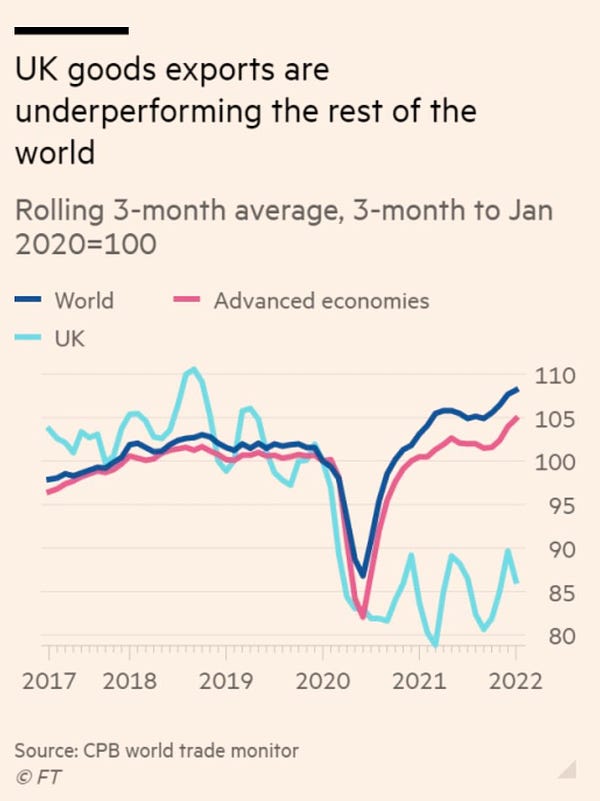
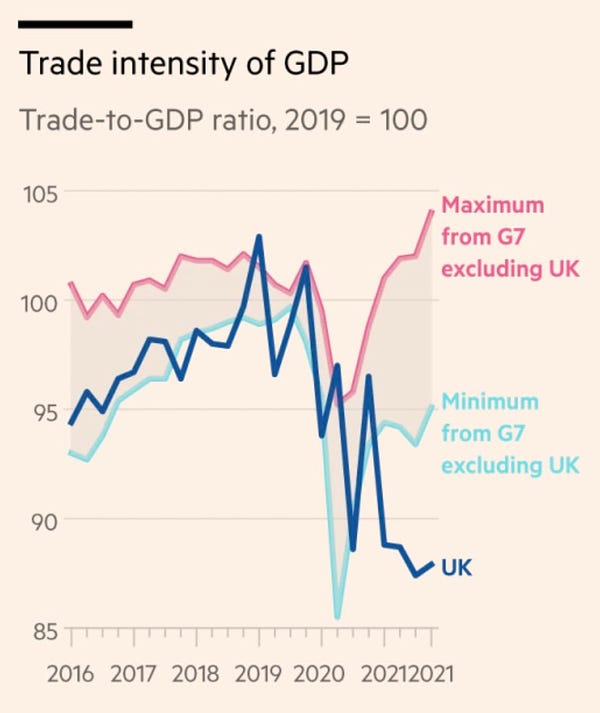


PAID SUBSCRIBER ONLY Content Below:
Paragraphs:
I would make this much stronger: I do not think you have any business introducing us to characters and starting to tell a story about them unless you have a great ending already in mind:
Timothy Burke: The Re-Read: Bad Endings: ‘I think most of us can tally up a balance sheet of unforgiveably bad endings that spoil everything that can before against “well, that wasn’t a great ending, but that’s ok”. (Not just for long-running franchises or major plot arcs, but sometimes even in a single episode or film.) If nothing else, that accounting off helps clarify how much a great ending that completely fulfills the rest of the show or franchise is a rare and beautiful thing. (Say, The Last Airbender series, or the Prydain series’ The High King.)…
LINK:
I think Felicia is overoptimistic here. Yes, the anti-political and anti-democratic strands of neoliberalism, in particular, are alive and thriving. But the wealth-accumulation and property-ownership strands are ready to be revivified by the next even partial rotation of the political-intellectual wheel:
Felicia Wong: Overview: Post-Neoliberalism at a Crossroads: ‘Neoliberalism is a set of cultural beliefs that celebrates and reifies individualism, property ownership, and wealth accumulation in ways that are profoundly anti-political and anti-democratic. Some of the wealth accumulation and property ownership elements of neoliberalism have come under question, especially for younger people. But the anti-political and anti-democratic strands of neoliberalism, in particular, are alive and thriving as we march into 2022…
LINK: <https://democracyjournal.org/magazine/64/overview-post-neoliberalism-at-a-crossroads/>
I confess that I am not as enthusiastice about claims that we are about to move beyond neoliberalism as many, many others. It is a stubborn beast. And it will likely fight us stubbornly so that all that we will attain will be half-a-loaf. Going back to social democracy—prioritizing full employment, an egalitarian income distribution, and a focus on policies compensating for externalities, plus giving voice to the many rather than the monied in deciding what society's priorities should be—seems likely to me to assemblr larger coalition and lead to much better outcomes than various things that are on offer. However, if you want to see someone who wants to move forward to something better than social democracy rather than simply settling for half-a-loaf, Darrick Hamilton is the person to pay attention to:
Darrick Hamilton: Neoliberalism & Race: ‘Younger generations and social movements may be expanding our priorities and notions of economic good away from the self-interested neoliberal frame to one that incorporates morality, sustainability, and humanity. Hopefully, it will lead to a politics that is not narrowly constrained by the status quo of what does and does not seem feasible at a given moment based on our immediate past. Hopefully, it will lead to a transformative race- and-gender conscious economic bill of rights. One that will ensure universally accessible quality jobs, health care, housing, schooling, financial services, capital, and one that ensures free mobility without the psychological (and physical) threat of detention or bodily harm. Rights that this country has long offered to some but continues to deny so many…
LINK: <https://democracyjournal.org/magazine/53/neoliberalism-and-race/>
Hey very flattering psychological, sociological, and intellectual portrait of the genius Adam Tooze. I would not, however, say that he has an extraordinary gift for synthesis: he has, rather, an extraordinary gift for learning and knowing stuff and learning and knowing the right stuff. A synthest imposes their view of reality upon readers. Adam gives you the information to construct your own view:
Molly Fischer: The Cult of Adam Tooze: ‘Tooze’s great intellectual power is a gift for synthesis. “He just digests staggering amounts of information,” said Ted Fertik… historical data, technical data, data about Russian currency reserves, data about the Nazi steel-tube industry — and returns with a reasonably accessible brief in hand. His omnivorously quantitative approach combines with his economic expertise to reveal familiar subjects in new ways…. The media contingent of Tooze’s fan base are readers who relish a chance to “feel marginally superior to Matt Yglesias,” as journalist Alex Pareene put it. Tooze conveys substance—a sense of undeniable expertise—in a way few of his fellow explainers can match…
LINK: <https://nymag.com/intelligencer/article/adam-tooze-profile.html>


